Unit 14 I remember meeting all of you in Grade 7. 单词讲解课件(30张PPT) 2022-2023学年人教版九年级英语全册
文档属性
| 名称 | Unit 14 I remember meeting all of you in Grade 7. 单词讲解课件(30张PPT) 2022-2023学年人教版九年级英语全册 | 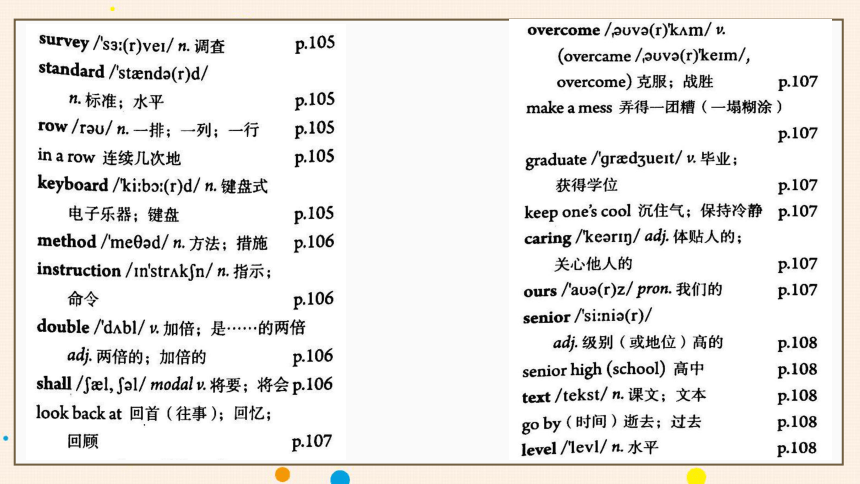 | |
| 格式 | pptx | ||
| 文件大小 | 1006.5KB | ||
| 资源类型 | 教案 | ||
| 版本资源 | 人教新目标(Go for it)版 | ||
| 科目 | 英语 | ||
| 更新时间 | 2023-07-17 13:43:43 | ||
图片预览

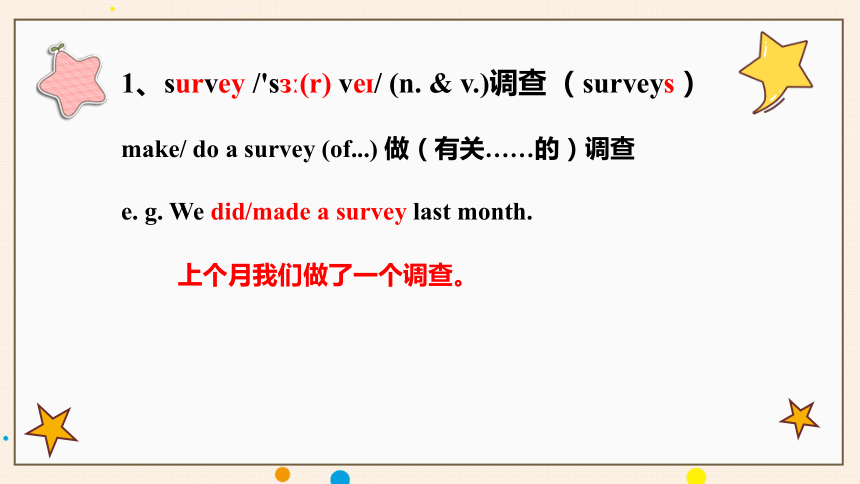
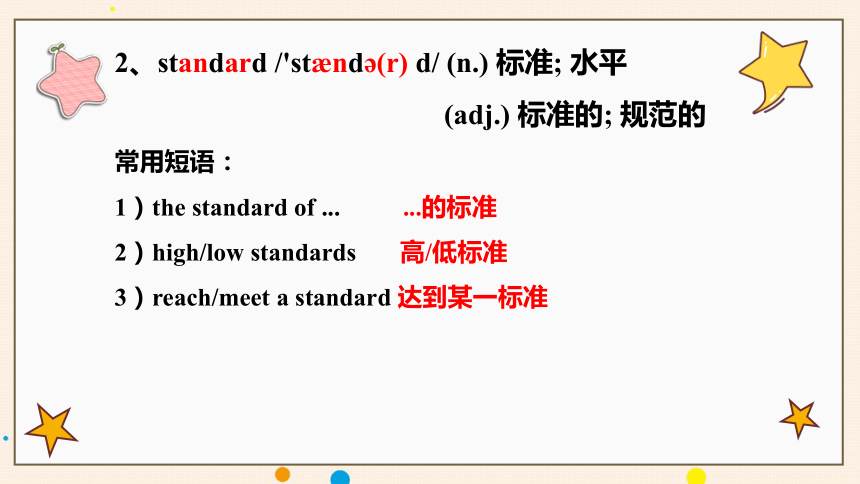
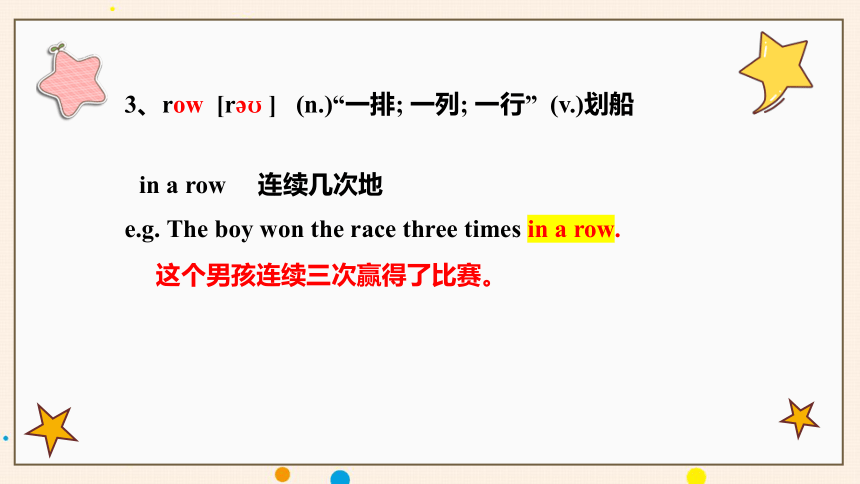
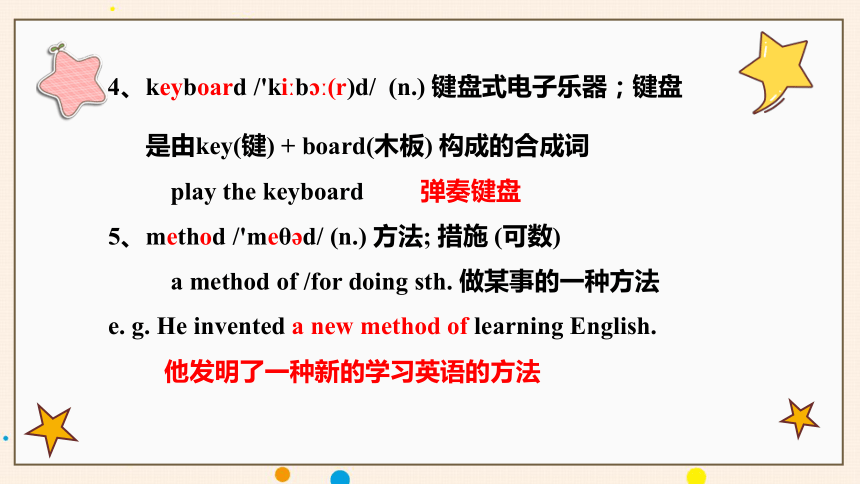
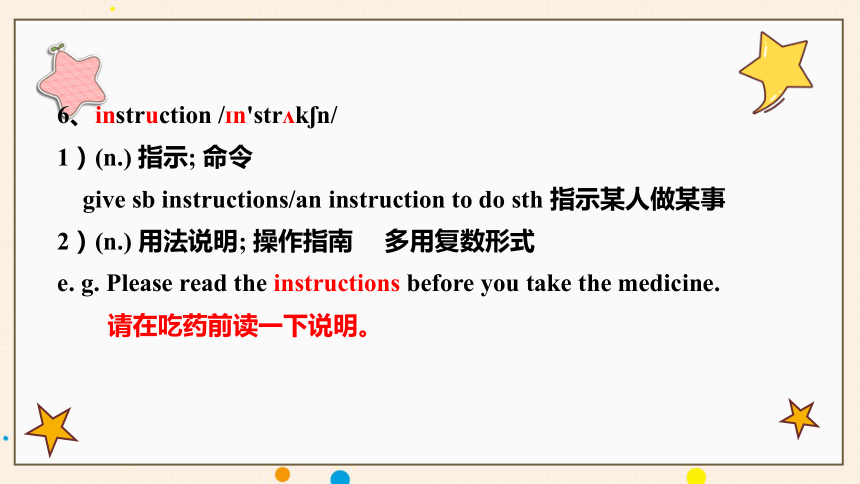
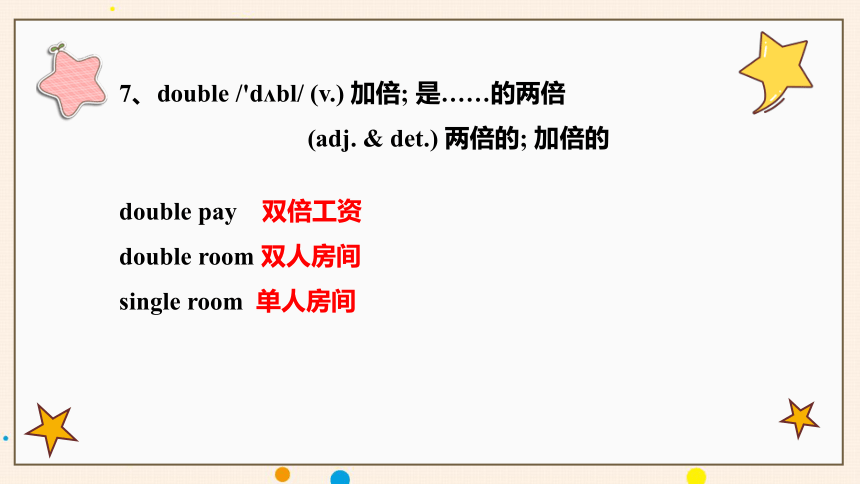
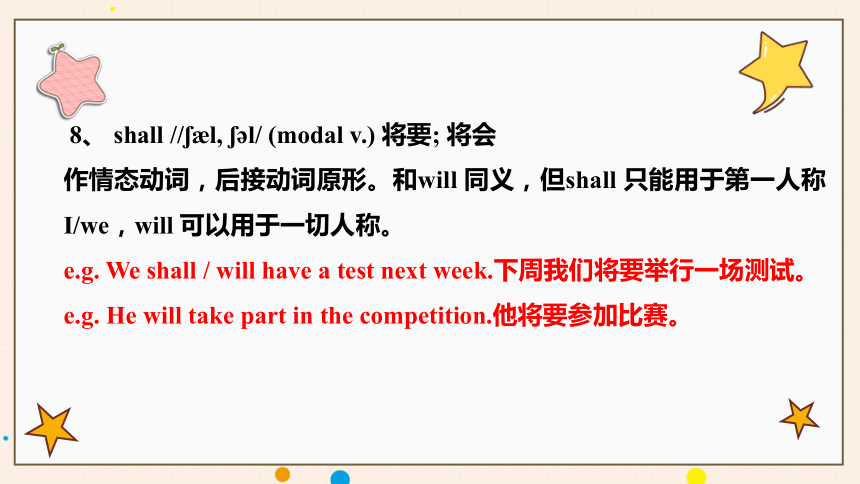
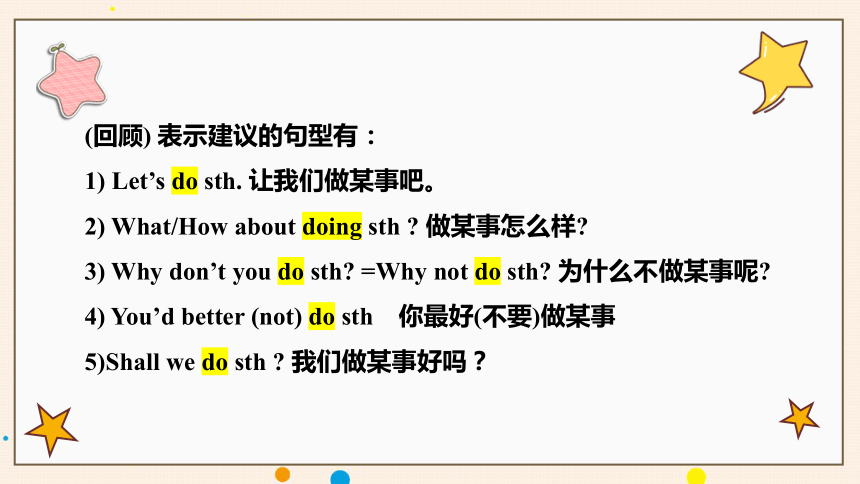
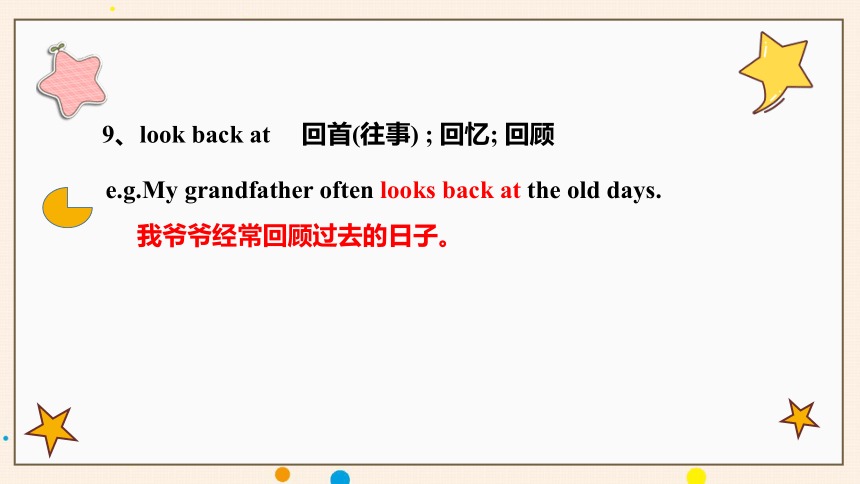
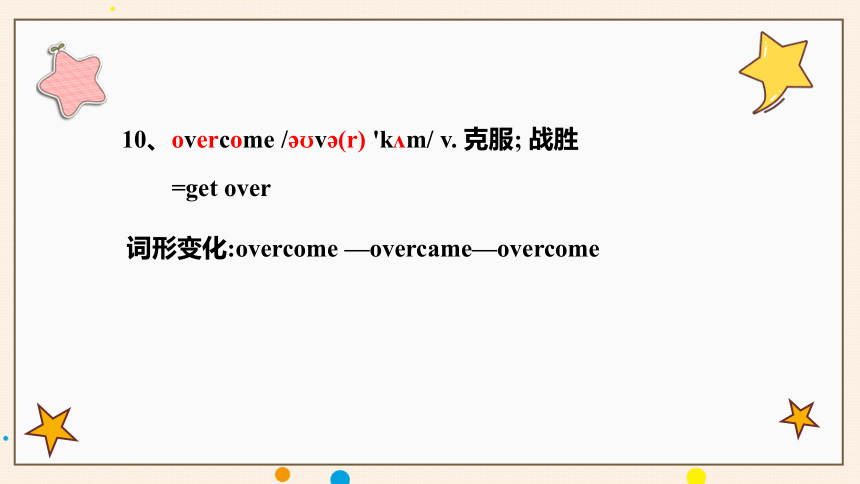
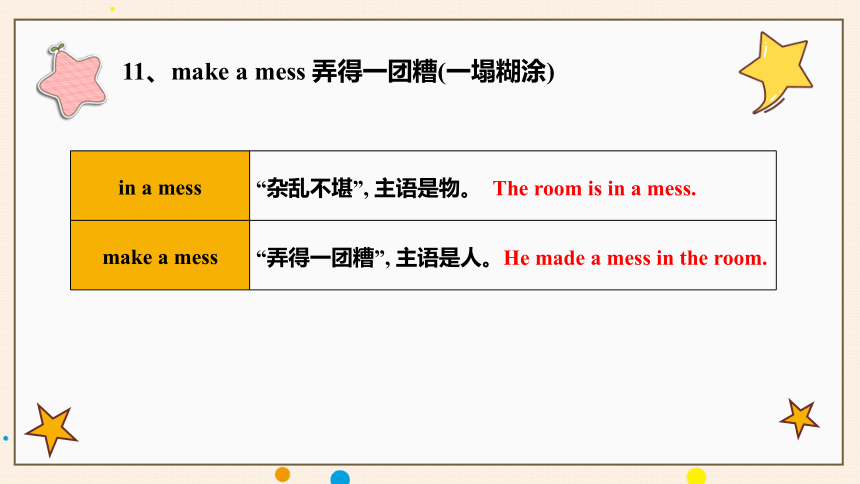
文档简介
(共30张PPT)
1、survey /'s (r) ve / (n. & v.)调查 (surveys)
make/ do a survey (of...) 做(有关……的)调查
e. g. We did/made a survey last month.
上个月我们做了一个调查。
2、standard /'st nd (r) d/ (n.) 标准; 水平
(adj.) 标准的; 规范的
常用短语:
1)the standard of ... ...的标准
2)high/low standards 高/低标准
3)reach/meet a standard 达到某一标准
3、row [r ] (n.)“一排; 一列; 一行” (v.)划船
in a row 连续几次地
e.g. The boy won the race three times in a row.
这个男孩连续三次赢得了比赛。
4、keyboard /'ki b (r)d/ (n.) 键盘式电子乐器;键盘
是由key(键) + board(木板) 构成的合成词
play the keyboard 弹奏键盘
5、method /'meθ d/ (n.) 方法; 措施 (可数)
a method of /for doing sth. 做某事的一种方法
e. g. He invented a new method of learning English.
他发明了一种新的学习英语的方法
6、instruction / n'str k n/
1)(n.) 指示; 命令
give sb instructions/an instruction to do sth 指示某人做某事
2)(n.) 用法说明; 操作指南 多用复数形式
e. g. Please read the instructions before you take the medicine.
请在吃药前读一下说明。
7、double /'d bl/ (v.) 加倍; 是……的两倍
(adj. & det.) 两倍的; 加倍的
double pay 双倍工资
double room 双人房间
single room 单人房间
8、 shall // l, l/ (modal v.) 将要; 将会
作情态动词,后接动词原形。和will 同义,但shall 只能用于第一人称I/we,will 可以用于一切人称。
e.g. We shall / will have a test next week.下周我们将要举行一场测试。
e.g. He will take part in the competition.他将要参加比赛。
(回顾) 表示建议的句型有:
1) Let’s do sth. 让我们做某事吧。
2) What/How about doing sth 做某事怎么样
3) Why don’t you do sth =Why not do sth 为什么不做某事呢
4) You’d better (not) do sth 你最好(不要)做某事
5)Shall we do sth 我们做某事好吗?
9、look back at 回首(往事) ; 回忆; 回顾
e.g.My grandfather often looks back at the old days.
我爷爷经常回顾过去的日子。
10、overcome / v (r) 'k m/ v. 克服; 战胜
词形变化:overcome —overcame—overcome
=get over
11、make a mess 弄得一团糟(一塌糊涂)
in a mess “杂乱不堪”, 主语是物。 The room is in a mess.
make a mess “弄得一团糟”, 主语是人。He made a mess in the room.
12、graduate /'ɡr d ue t/ (v.) 毕业; 获得学位(n.) “大学毕业生”
graduate from 意为“从……毕业”
e. g. He graduated from Peking University.
他毕业于北京大学。
(n.) graduation, “毕业”
after graduation 毕业后
13、keep one’s cool 沉住气; 保持冷静
=keep calm/cool
e. g. Whatever happens, she always keeps her cool.
无论发生什么, 她总能保持冷静。
14、caring /'ke r / adj. 体贴人的;关心他人的
e.g. She is a caring girl. 她是一个体贴人的女孩
care (v.) 关心;关怀
careless (adj.) 粗心的
careful → carefully
(adj.) 仔细的 (adv.) 仔细地;认真地
15、 ours /'a (r) z/ pron. 我们的
e. g. Their food is on the plate. Ours is in the bag.
他们的食物在盘子里。我们的在包里。
e. g. Those books aren’t ours. 那些书不是我们的。
作主语
作表语
形容词性物主代词后面必须加名词,
名词性物主代词的后面不能加名词。
16、senior /'si ni (r) / adj. 级别(或地位) 高的
它们都没有比较级和最高级。
senior high school 高中
junior high school 初中
primary school 小学
be senior to 比…年长
e. g. John is seven years senior to Tom.
约翰比汤姆年长七岁。
17、text (n.) 课本;课文
18、go by (时间) 逝去;过去
e. g. I can’t believe how fast the time went by!
我真不敢相信时间过得这么快!
19、level /'levl/
1)“水平”
①high/low level 高/ 低水平 ② medical level 医疗水平
2)“(与地面或过去位置相对的)高度”
sea level 海平面
20. degree /d 'ɡri / (n.) ( 大学) 学位;度数;程度
doctor’s degree 博士学位
21. manager /'m n d (r)/ n. 经理;经营者
manage (v.) 经营,管理
believe in 相信某人(+sb.)
believe 相信某人说的话 (+sth.)
e.g. All the students believe in him. 所有的学生都信任他。
She doesn't believe what I said. 她不相信我说的话。
21. believe in 信任,信赖
22. gentleman (n.) 先生;绅士
(pl.) gentlemen
23. ceremony (n.) 典礼;仪式
graduation ceremny 毕业典礼
24. first of all 首先
常放在句首
25. congratulate /k n'ɡr t ule t/ (v.) 祝贺( 及物动词)
congratulation (n.) “祝贺”
常用在情景交际中,一般使用复数。
e.g. Congratulations! You passed the exam!
恭喜!你通过了考试!
26. thirsty (adj.) 渴望的;口渴的
be thirsty for... 渴望;渴求...
27. thankful (adj.) 感谢;感激
be thankful to sb. for sth. 因为某事而感激某人
e.g. We must be thankful to our parents.
我们必须对父母心存感激。
29. task (n.) 任务;工作 (可数)
28. lastly /'lɑ stli/ (adv.) 最后
= finally
30. ahead (adv.) “向前面;在前面
ahead of 在…前面 既可指时间,也可指空间
e.g. There are many cars ahead of us.
我们的前面有很多车。
Go ahead. 请吧,去吧,做吧(口语)
31. along with 连同;除…以外还
连接前后两个主语时,谓语动词 要用就远原则。
类似的语还有with、together with、as well as等。
e.g. He along with his two friends going to Hong Kong next month.
e.g. His two friends along with he going to Hong Kong next month.
is
are
32. responsible /r 'sp ns bl/ (adj.) 有责任心的
be responsible for... 对...有责任,负责任
e.g. We should be responsible for ourselves.
我们应该对自己负责。
responsibility (n.) 责任
33. separate /'sep r t/ (adj.) 单独的;分离的
/'sep re t/ (v.) 分开;分离
separate A from B 把A和B分开
e.g. They separated the patients from others.
他们把病人与其他人分离开来。
34. set out
1)出发,启程=set off
set out/off for+ 地点 出发前往某地
e.g. We set out/off for the zoo at 8:00.
我们八点出发去动物园。
2)着手;开始
set out to do sth. 开始(着手) 做某事
35. wing (n.) 翅膀;翼
1、survey /'s (r) ve / (n. & v.)调查 (surveys)
make/ do a survey (of...) 做(有关……的)调查
e. g. We did/made a survey last month.
上个月我们做了一个调查。
2、standard /'st nd (r) d/ (n.) 标准; 水平
(adj.) 标准的; 规范的
常用短语:
1)the standard of ... ...的标准
2)high/low standards 高/低标准
3)reach/meet a standard 达到某一标准
3、row [r ] (n.)“一排; 一列; 一行” (v.)划船
in a row 连续几次地
e.g. The boy won the race three times in a row.
这个男孩连续三次赢得了比赛。
4、keyboard /'ki b (r)d/ (n.) 键盘式电子乐器;键盘
是由key(键) + board(木板) 构成的合成词
play the keyboard 弹奏键盘
5、method /'meθ d/ (n.) 方法; 措施 (可数)
a method of /for doing sth. 做某事的一种方法
e. g. He invented a new method of learning English.
他发明了一种新的学习英语的方法
6、instruction / n'str k n/
1)(n.) 指示; 命令
give sb instructions/an instruction to do sth 指示某人做某事
2)(n.) 用法说明; 操作指南 多用复数形式
e. g. Please read the instructions before you take the medicine.
请在吃药前读一下说明。
7、double /'d bl/ (v.) 加倍; 是……的两倍
(adj. & det.) 两倍的; 加倍的
double pay 双倍工资
double room 双人房间
single room 单人房间
8、 shall // l, l/ (modal v.) 将要; 将会
作情态动词,后接动词原形。和will 同义,但shall 只能用于第一人称I/we,will 可以用于一切人称。
e.g. We shall / will have a test next week.下周我们将要举行一场测试。
e.g. He will take part in the competition.他将要参加比赛。
(回顾) 表示建议的句型有:
1) Let’s do sth. 让我们做某事吧。
2) What/How about doing sth 做某事怎么样
3) Why don’t you do sth =Why not do sth 为什么不做某事呢
4) You’d better (not) do sth 你最好(不要)做某事
5)Shall we do sth 我们做某事好吗?
9、look back at 回首(往事) ; 回忆; 回顾
e.g.My grandfather often looks back at the old days.
我爷爷经常回顾过去的日子。
10、overcome / v (r) 'k m/ v. 克服; 战胜
词形变化:overcome —overcame—overcome
=get over
11、make a mess 弄得一团糟(一塌糊涂)
in a mess “杂乱不堪”, 主语是物。 The room is in a mess.
make a mess “弄得一团糟”, 主语是人。He made a mess in the room.
12、graduate /'ɡr d ue t/ (v.) 毕业; 获得学位(n.) “大学毕业生”
graduate from 意为“从……毕业”
e. g. He graduated from Peking University.
他毕业于北京大学。
(n.) graduation, “毕业”
after graduation 毕业后
13、keep one’s cool 沉住气; 保持冷静
=keep calm/cool
e. g. Whatever happens, she always keeps her cool.
无论发生什么, 她总能保持冷静。
14、caring /'ke r / adj. 体贴人的;关心他人的
e.g. She is a caring girl. 她是一个体贴人的女孩
care (v.) 关心;关怀
careless (adj.) 粗心的
careful → carefully
(adj.) 仔细的 (adv.) 仔细地;认真地
15、 ours /'a (r) z/ pron. 我们的
e. g. Their food is on the plate. Ours is in the bag.
他们的食物在盘子里。我们的在包里。
e. g. Those books aren’t ours. 那些书不是我们的。
作主语
作表语
形容词性物主代词后面必须加名词,
名词性物主代词的后面不能加名词。
16、senior /'si ni (r) / adj. 级别(或地位) 高的
它们都没有比较级和最高级。
senior high school 高中
junior high school 初中
primary school 小学
be senior to 比…年长
e. g. John is seven years senior to Tom.
约翰比汤姆年长七岁。
17、text (n.) 课本;课文
18、go by (时间) 逝去;过去
e. g. I can’t believe how fast the time went by!
我真不敢相信时间过得这么快!
19、level /'levl/
1)“水平”
①high/low level 高/ 低水平 ② medical level 医疗水平
2)“(与地面或过去位置相对的)高度”
sea level 海平面
20. degree /d 'ɡri / (n.) ( 大学) 学位;度数;程度
doctor’s degree 博士学位
21. manager /'m n d (r)/ n. 经理;经营者
manage (v.) 经营,管理
believe in 相信某人(+sb.)
believe 相信某人说的话 (+sth.)
e.g. All the students believe in him. 所有的学生都信任他。
She doesn't believe what I said. 她不相信我说的话。
21. believe in 信任,信赖
22. gentleman (n.) 先生;绅士
(pl.) gentlemen
23. ceremony (n.) 典礼;仪式
graduation ceremny 毕业典礼
24. first of all 首先
常放在句首
25. congratulate /k n'ɡr t ule t/ (v.) 祝贺( 及物动词)
congratulation (n.) “祝贺”
常用在情景交际中,一般使用复数。
e.g. Congratulations! You passed the exam!
恭喜!你通过了考试!
26. thirsty (adj.) 渴望的;口渴的
be thirsty for... 渴望;渴求...
27. thankful (adj.) 感谢;感激
be thankful to sb. for sth. 因为某事而感激某人
e.g. We must be thankful to our parents.
我们必须对父母心存感激。
29. task (n.) 任务;工作 (可数)
28. lastly /'lɑ stli/ (adv.) 最后
= finally
30. ahead (adv.) “向前面;在前面
ahead of 在…前面 既可指时间,也可指空间
e.g. There are many cars ahead of us.
我们的前面有很多车。
Go ahead. 请吧,去吧,做吧(口语)
31. along with 连同;除…以外还
连接前后两个主语时,谓语动词 要用就远原则。
类似的语还有with、together with、as well as等。
e.g. He along with his two friends going to Hong Kong next month.
e.g. His two friends along with he going to Hong Kong next month.
is
are
32. responsible /r 'sp ns bl/ (adj.) 有责任心的
be responsible for... 对...有责任,负责任
e.g. We should be responsible for ourselves.
我们应该对自己负责。
responsibility (n.) 责任
33. separate /'sep r t/ (adj.) 单独的;分离的
/'sep re t/ (v.) 分开;分离
separate A from B 把A和B分开
e.g. They separated the patients from others.
他们把病人与其他人分离开来。
34. set out
1)出发,启程=set off
set out/off for+ 地点 出发前往某地
e.g. We set out/off for the zoo at 8:00.
我们八点出发去动物园。
2)着手;开始
set out to do sth. 开始(着手) 做某事
35. wing (n.) 翅膀;翼
同课章节目录
- Unit 1 How can we become good learners.
- Section A
- Section B
- Unit 2 I think that mooncakes are delicious!
- Section A
- Section B
- Unit 3 Could you please tell me where the restroom
- Section A
- Section B
- Unit 4 I used to be afraid of the dark.
- Section A
- Section B
- Unit 5 What are the shirts made of?
- Section A
- Section B
- Review of Units 1-5
- Unit 6 When was it invented?
- Section A
- Section B
- Unit 7 Teenagers should be allowed to choose their
- Section A
- Section B
- Unit 8 It must belong to Carla.
- Section A
- Section B
- Unit 9 I like music that I can dance to.
- Section A
- Section B
- Unit 10 You're supposed to shake hands.
- Section A
- Section B
- Review of Units 6-10
- Unit 11 Sad movies make me cry.
- Section A
- Section B
- Unit 12 Life is full of the unexpected
- Section A
- Section B
- Unit 13 We're trying to save the earth!
- Section A
- Section B
- Unit 14 I remember meeting all of you in Grade 7.
- Section A
- Section B
- Review of Units 11-14
